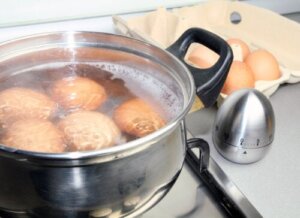How to Pasteurize Eggs at Home


Written and verified by the nutritionist Saúl Sánchez Arias
Pasteurized eggs are frequently used in the catering industry to eliminate the microbiological risk of this food in its fresh version. Would you like to learn how to pasteurize eggs at home?
Before we start, we should mention that eggs are a reservoir of many bacteria that can be harmful to humans, and most of them are concentrated in the shell.
However, these pathogens could enter the egg under certain conditions. If this were to happen, certain people’s health, especially the most vulnerable, could be put at risk.
Pasteurize eggs at home
Pasteurization is nothing more than a high-temperature heat treatment that kills pathogenic micro-organisms and increases the health and safety of a foodstuff. In the case of eggs, you just need to keep them in a pot with water at 60 degrees Centigrade (140 Fahrenheit) for 4 minutes to minimize the risks.
It’s best to use a kitchen thermometer to monitor the temperature at all times. At 64 degrees (147 Fahrenheit), part of the egg begins to coagulate, which would cause it to cook, something that we don’t want to happen in this case.
For this reason, you have to be precise when applying heat to limit the presence of bacteria without generating a change in the organoleptic characteristics of the food itself.

However, it’s also possible to buy this type of product. Although they’re usually purchased in specialized wholesale stores, some supermarkets have such a variety available to the consumer.
It’s a great option for the preparation of sauces such as mayonnaise, especially when it’s going to be consumed by people who fall within risk groups, such as pregnant women.
For more information read this article: How to Prevent Food Poisoning
Other pasteurization methods
There are other ways to pasteurize eggs at home for later use in different culinary recipes. The most common way is to place the eggs in a pot in a water bath. In this case, it’s also necessary to make sure that the temperature of the water doesn’t exceed 64 degrees Centigrade
You need to crack the egg inside the container contained in the pot and the process is completed after 4 minutes. From this point on, the food is ready to be included in another recipe, although this must be done immediately. You can’t keep it or put it in the fridge, as it’s more exposed to pathogens when it’s out of the shell.
Bear in mind that many pastry recipes use raw eggs, as do sauces.
Although it’s true that, in normal conditions, it isn’t necessary to take this measure, summer heat will increase the risk significantly. The higher the atmospheric temperature, the better care should be taken when handling and using eggs.
The risks of bacterial poisoning
It’s important to bear in mind that bacterial poisoning can cause significant changes in the digestive system, and this can affect a person’s health in the medium and long term.
Normally, this type of process is characterized by symptoms such as diarrhea, gas, and abdominal pain. Vomiting may also occur in some situations.

However, one of the associated risks here is dehydration from fluid loss. Water imbalance is especially dangerous in older people, as they have a lower percentage of water in their bodies. They could experience an increase in body temperature that has an impact on physiological functions.
According to research published in the Annals of Nutrition & Metabolism, when the level of water in the body is reduced, it causes changes in the cognitive system, which could lead to delirium.
This situation is also worrying in the case of children, collectives susceptible to complications from water imbalance processes.
You may also be interested in: Should I Store Eggs Inside or Outside the Fridge?
Dangers in pregnant women
During pregnancy, you need to take extreme precautions at a dietary level to avoid poisoning that could endanger the life of the fetus. The consumption of sauces that use raw eggs among their ingredients is totally forbidden.
This kind of food could cause a miscarriage if contaminated with certain microorganisms. This is evidenced by a study published in Microbiology.
The most dangerous of all bacteria for the fetus is listeria. In addition to causing miscarriages, it increases the risk of premature birth or interferes with the proper development of the baby’s cognitive system.
For this reason, all necessary measures must be taken to ensure that this microorganism isn’t present in the mother’s diet. It can be found in raw milk and poultry.
As a general rule, raw animal food should be avoided during pregnancy. Many contain bacteria that aren’t necessarily pathogenic for the mother, but which may adversely affect the development of the fetus. Such a situation must be avoided in order for pregnancy to proceed optimally.
What other foods can be pasteurized?
Eggs aren’t the only foodstuffs that can be pasteurized. Milk and dairy products are also usually subjected to this sterilization process to ensure their healthiness.
Even so, it’s possible to find certain varieties of raw milk and fresh cheeses on the market. You need to be very careful when consuming them, in order to avoid intoxication.
In immunosuppressed people, it’s totally inadvisable to eat dairy products that haven’t been subjected to a thermal process to ensure the absence of microorganisms inside. In these cases, it’s easier to experience life-threatening complications such as sepsis.
As stated in a study published in Surgical Infections, sepsis is one of the leading causes of death resulting from infection. It consists of the entry of pathogens into the bloodstream, which causes them to spread throughout the body. People with alterations in the microbiota or problems in the defense system are more vulnerable to it.
It is easy to pasteurize eggs at home
As you’ve seen, the method to pasteurize eggs at home isn’t at all complicated. It doesn’t even take much time, and so it’s a perfect method to implement during hot periods, in order to ensure the healthiness of these nutritious foods. Thus, people who belong to risk groups will be able to consume them without a problem.
However, keep in mind that many other measures related to food hygiene must be respected. These include the correct cleaning of kitchen utensils, good food preservation practices, hand washing, etc….Only by following a series of basic guidelines can we drastically reduce the rate of bacterial infections worldwide.
All cited sources were thoroughly reviewed by our team to ensure their quality, reliability, currency, and validity. The bibliography of this article was considered reliable and of academic or scientific accuracy.
- Pross N. (2017). Effects of Dehydration on Brain Functioning: A Life-Span Perspective. Annals of nutrition & metabolism, 70 Suppl 1, 30–36. https://doi.org/10.1159/000463060
- Pizarro-Cerdá, J., & Cossart, P. (2019). Microbe Profile: Listeria monocytogenes: a paradigm among intracellular bacterial pathogens. Microbiology (Reading, England), 165(7), 719–721. https://doi.org/10.1099/mic.0.000800
- Napolitano L. M. (2018). Sepsis 2018: Definitions and Guideline Changes. Surgical infections, 19(2), 117–125. https://doi.org/10.1089/sur.2017.278
This text is provided for informational purposes only and does not replace consultation with a professional. If in doubt, consult your specialist.








